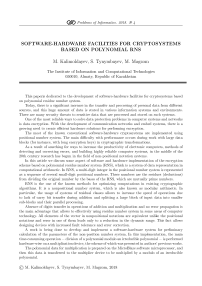Software-hardware facilities for cryptosystems based on polynomial RNS
Автор: Калимолдаев Максат Нурадилович, Тынымбаев Сахыбай, Мазгом Мирас Мухтарулы
Журнал: Проблемы информатики @problem-info
Рубрика: Прикладные информационные технологии
Статья в выпуске: 4 (41), 2018 года.
Бесплатный доступ
This paperis dedicated to the development of software-hardware facilities for cryptosystems based on polynomial residue number system. Today, there is a significant increase in the transfer and processing of personal data from different sources, and this huge amount of data is stored in various information systems and environments. There arc many security threats to sensitive data that arc processed and stored on such systems. One of the most reliable ways to solve data protection problems in computer systems and networks is data encryption. With the development of communication networks and embed systems, there is a growing need to create efficient hardware solutions for performing encryption. The most of the known conventional software-hardware cryptosystems arc implemented using positional number system. The main difficulty with performance occurs during work with large data blocks (for instance, with long encryption keys) in cryptographic transformations. As a result of searching for ways to increase the productivity of electronic computers, methods of detecting and correcting errors, and building highly reliable computer systems, in the middle of the 20th century research has begun in the field of non-positional notation systems...
Residue number system, block cipher, nonpositional polynomial notation, fpga programming
Короткий адрес: https://sciup.org/143168896
IDR: 143168896 | УДК: 004.056.5
Список литературы Software-hardware facilities for cryptosystems based on polynomial RNS
- Gura N. „Comparing Elliptic Curve Cryptography and RSA on 8-bit CPUs " Proc. 6th Int'l Workshop Cryptographic Hardware and Embedded Systems (CHES 04) LNCS 3156. Springer, 2004. P. 119-132.
- Kumar S. Elliptic Curve Cryptography for Constrained Devices, doctoral dissertation, Electrical Engineering and Information Sciences. Bochum: Germany; Ruhr University, 2006.
- Omondi, B. Premkumar, Residue Number Systems: Theory and Implementation, 2007.
- Biyashev R., Nyssanbayeva S. Algorithm for Creation a Digital Signature with Error Detection and Correction // Cybernetics and Systems Analysis. 2012. V. 48. № 4. P. 489-497.
- Kalimoldayev M., Nyssanbayeva S., Magzom M. Model of nonconventional encryption algorithm based on nested Feistel network // Open Engineering. 2016. № 6. P. 225-227.
- Biyashev R., Kalimoldayev M., Nyssanbayeva S., Magzom M. Development of an encryption algorithm based on nonpositional polynomial notations // Proceedings of the International Conference on Advanced Materials Science and Environmental Engineering (AMSEE 2016). Chiang Mai, Thailand, June 26- 27, 2016. P. 243-245.
- Biyashev R., Nyssanbayeva S., Begimbayeva Ye., Magzom M. Building modified modular cryptographic systems // International Journal of Applied Mathematics and Informatics. 2015. V.9. P. 103-109.
- Tynymbayev S., Kapalova N., Magzom M. Development and implementation of a hardware multiplier in the non-position numeral system (in Russian) // Proceedings of IICT conference „Modern problems of computer science and computer technologies Almaty, 2017. P. 263-270.
- Arty A7: Artix-7 FPGA Development Board for Makers and Hobbyists. [El. Res.]: https: // store.digilentinc.com/arty-a7-artix-7-fpga-development-board-for-maker s-and-hobbyists/ (may 2018).
- Acosta A., Addabbo T., Tena-S6nchez E. Embedded electronic circuits for cryptography, hardware security and true random number generation: an overview // Int. J. Circ. Theor. Appl. 2017. № 45. P. 145-169.
- Rooju Chokshi, Krzysztof S. Berezowski, Aviral Shrivastava, Stanisiaw J. Piestrak. Exploiting Residue Number System for Power-Efficient Digital Signal Processing in Embedded Processors // Proceedings of the CASES '09, Grenoble, France, P. 19-28.
- Schinianakis D., Stouraitis T. Residue Number Systems in Cryptography: Design, Challenges, Robustness // Secure System Design and Trustable Computing. Springer, 2016.
- Sousa L., Antro S., Martins P. Combining residue arithmetic to design efficient cryptographic circuits and systems // IEEE Circuits and Systems Magazine, 2016.


